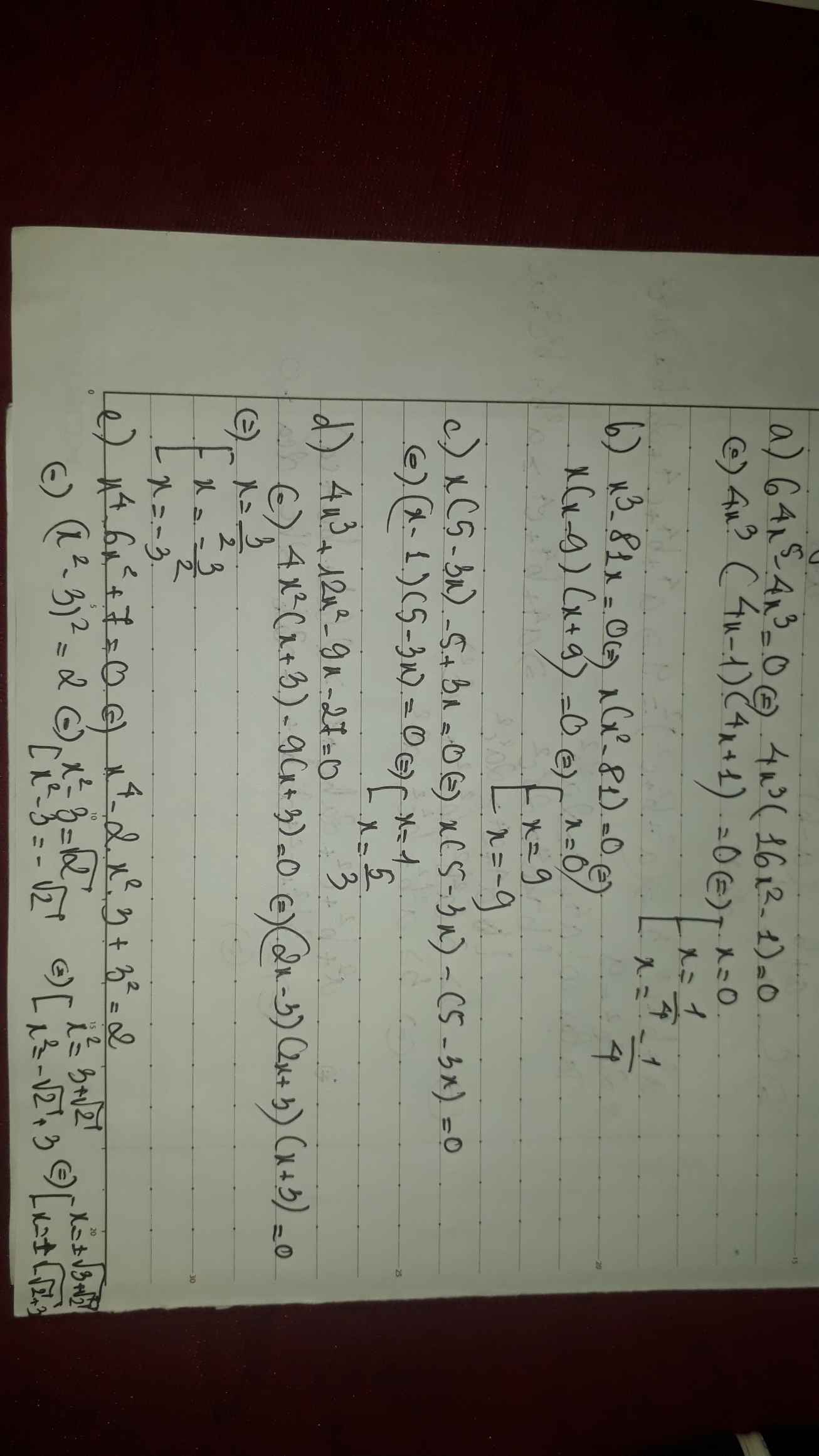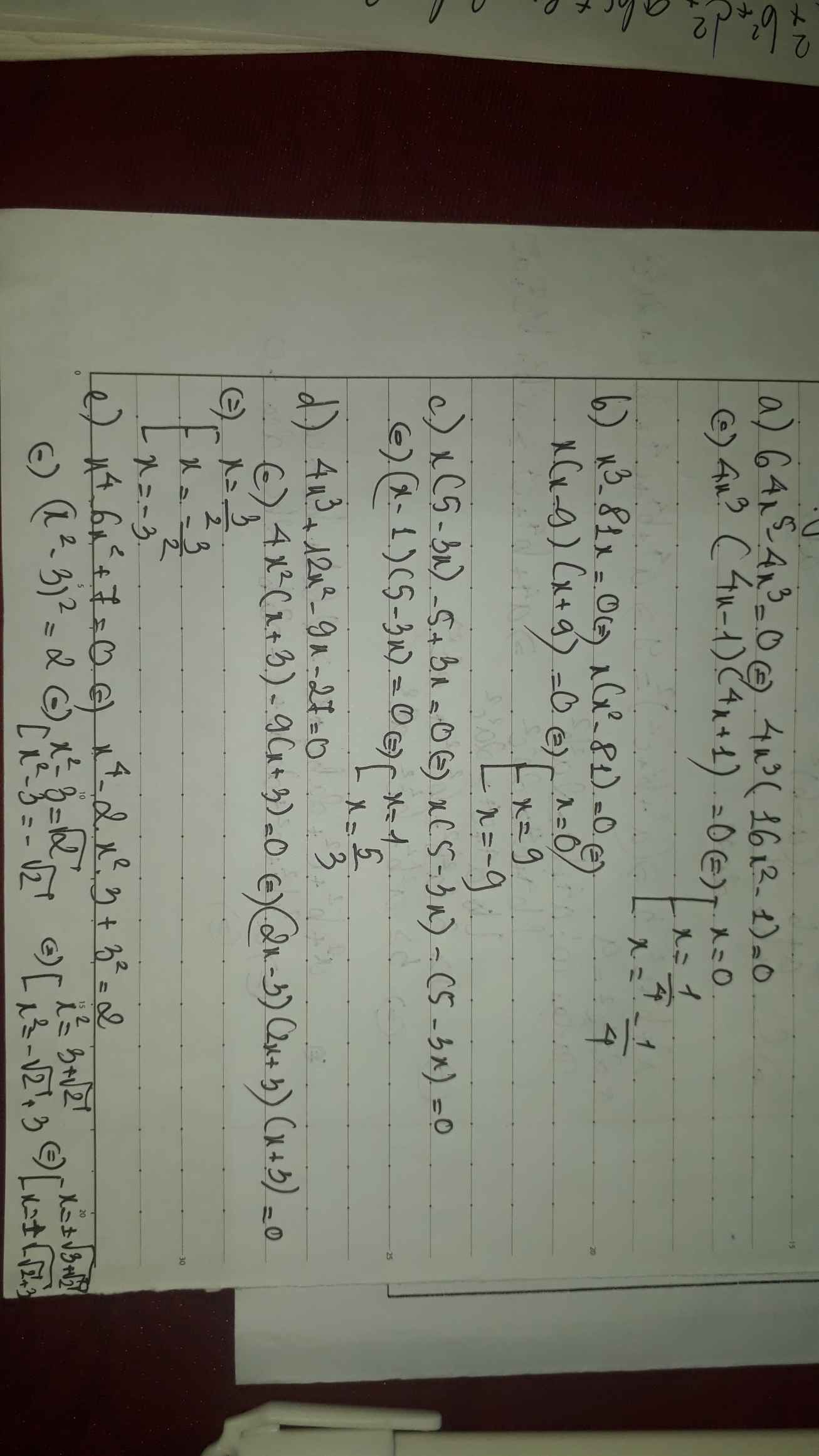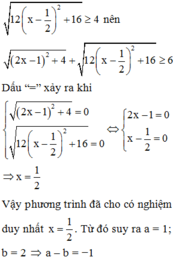Giải phương trình: x4+4x3+12x2+12x+27=0

Những câu hỏi liên quan
Gi ải các phương trình sau
e) x3-7x+6=0
f) x4-4x3+12x-9=0
g)x5-5x3+4x=0
h) x4-4x3+3x2+4x-4=0
a.
\(x^3-7x+6=0\)
\(\Leftrightarrow x^3-3x^2+2x+3x^2-9x+6=0\)
\(\Leftrightarrow x\left(x^2-3x+2\right)+3\left(x^2-3x+2\right)=0\)
\(\Leftrightarrow\left(x^2-3x+2\right)\left(x+3\right)=0\)
\(\Leftrightarrow\left(x^2-x-2x+2\right)\left(x+3\right)=0\)
\(\Leftrightarrow\left[x\left(x-1\right)-2\left(x-1\right)\right]\left(x+3\right)=0\)
\(\Leftrightarrow\left(x-1\right)\left(x-2\right)\left(x+3\right)=0\)
\(\Rightarrow\left[{}\begin{matrix}x=1\\x=2\\x=-3\end{matrix}\right.\)
Đúng 3
Bình luận (0)
f.
\(x^4-4x^3+12x-9=0\)
\(\Leftrightarrow x^4-4x^3+3x^2-3x^2+12x-9=0\)
\(\Leftrightarrow x^2\left(x^2-4x+3\right)-3\left(x^2-4x+3\right)=0\)
\(\Leftrightarrow\left(x^2-4x+3\right)\left(x^2-3\right)=0\)
\(\Leftrightarrow\left(x^2-x-3x+3\right)\left(x^2-3\right)=0\)
\(\Leftrightarrow\left[x\left(x-1\right)-3\left(x-1\right)\right]\left(x^2-3\right)=0\)
\(\Leftrightarrow\left(x-1\right)\left(x-3\right)\left(x^2-3\right)=0\)
\(\Rightarrow\left[{}\begin{matrix}x=1\\x=3\\x=\pm\sqrt{3}\end{matrix}\right.\)
Đúng 3
Bình luận (0)
g.
\(x^5-5x^3+4x=0\)
\(\Leftrightarrow x\left(x^4-5x^2+4\right)=0\)
\(\Leftrightarrow x\left(x^4-x^2-4x^2+4\right)=0\)
\(\Leftrightarrow x\left[x^2\left(x^2-1\right)-4\left(x^2-1\right)\right]=0\)
\(\Leftrightarrow x\left(x^2-1\right)\left(x^2-4\right)=0\)
\(\Leftrightarrow x\left(x-1\right)\left(x+1\right)\left(x-2\right)\left(x+2\right)=0\)
\(\Rightarrow\left[{}\begin{matrix}x=0\\x=\pm1\\x=\pm2\end{matrix}\right.\)
Đúng 2
Bình luận (0)
Xem thêm câu trả lời
Tìm x:
a) 64x5-4x3=0
b) x3-81x=0
c) x(5-3x)-5+3x=0
d) 4x3+12x2-9x-27=0
e) x4-6x2+7=0
Tìm x:
a) 64x5-4x3=0
b) x3-81x=0
c) x(5-3x)-5+3x=0
d) 4x3+12x2-9x-27=0
e) x4-6x2+7=0
Giải các phương trình sau:a, (9x2 - 4)(x + 1) (3x +2)(x2 - 1)b, (x - 1)2 - 1 + x2 (1 - x)(x + 3)c, (x2 - 1)(x + 2)(x - 3) (x - 1)(x2 - 4)(x + 5)d, x4 + x3 + x + 1 0e, x3 - 7x + 6 0f, x4 - 4x3 + 12x - 9 0g, x5- 5x3 + 4x 0h, x4 - 4x3 + 3x2 + 4x - 4 0
Đọc tiếp
Giải các phương trình sau:
a, (9x2 - 4)(x + 1) = (3x +2)(x2 - 1)
b, (x - 1)2 - 1 + x2 = (1 - x)(x + 3)
c, (x2 - 1)(x + 2)(x - 3) = (x - 1)(x2 - 4)(x + 5)
d, x4 + x3 + x + 1 = 0
e, x3 - 7x + 6 = 0
f, x4 - 4x3 + 12x - 9 = 0
g, x5- 5x3 + 4x = 0
h, x4 - 4x3 + 3x2 + 4x - 4 = 0
a, \(\Leftrightarrow\left(9x^2-4\right)\left(x+1\right)-\left(3x+2\right)\left(x-1\right)\left(x+1\right)=0\)
\(\Leftrightarrow\left(x+1\right)\left(\left(9x^2-4\right)-\left(\left(3x+2\right)\left(x-1\right)\right)\right)=0\)
\(\Leftrightarrow\left(x+1\right)\left(9x^2-4-\left(3x^2-x-2\right)\right)=0\)
\(\Leftrightarrow\left(x+1\right)\left(9x^2-4-3x^2+x+2\right)=0\)
\(\Leftrightarrow\left(x+1\right)\left(3x^2+x-2\right)=0\)
\(\Leftrightarrow\left(x+1\right)=0;3x^2+x-2=0\)
=> x=-1
với \(3x^2+x-2=0\)
ta sử dụng công thức bậc 2 suy ra : \(x=\dfrac{2}{3};x=-1\)
Vậy ghiệm của pt trên \(S\in\left\{-1;\dfrac{2}{3}\right\}\)
Đúng 0
Bình luận (0)
b: \(\Leftrightarrow x^2-2x+1-1+x^2=x+3-x^2-3x\)
\(\Leftrightarrow2x^2-2x=-x^2-2x+3\)
\(\Leftrightarrow3x^2=3\)
hay \(x\in\left\{1;-1\right\}\)
c: \(\Leftrightarrow\left(x-1\right)\left(x+1\right)\left(x+2\right)\left(x-3\right)-\left(x-1\right)\left(x-2\right)\left(x+2\right)\left(x+5\right)=0\)
\(\Leftrightarrow\left(x-1\right)\left(x+2\right)\left[\left(x+1\right)\left(x-3\right)-\left(x-2\right)\left(x+5\right)\right]=0\)
\(\Leftrightarrow\left(x-1\right)\left(x+2\right)\left(x^2-2x-3-x^2-3x+10\right)=0\)
\(\Leftrightarrow\left(x-1\right)\left(x+2\right)\left(-5x+7\right)=0\)
hay \(x\in\left\{1;-2;\dfrac{7}{5}\right\}\)
Đúng 0
Bình luận (0)
giải phương trình sau:
a. (9x2-4)(x+1) = (3x+2) (x2-1)
b. (x-1)2-1+x2 = (1-x)(x+3)
c. (x2-1)(x+2)(x-3) = (x-1)(x2-4)(x+5)
d. x4+x3+x+1=0
e. x3-7x+6 = 0
f. x4-4x3+12x-9 = 0
g. x5-5x3+4x = 0
h. x4-4x3+3x2+4x-4 = 0
m.n jup vs
Giải các phương trình:
a
)
3
x
4
–
12
x
2
+
9
0
;
b...
Đọc tiếp
Giải các phương trình:
a ) 3 x 4 – 12 x 2 + 9 = 0 ; b ) 2 x 4 + 3 x 2 – 2 = 0 ; c ) x 4 + 5 x 2 + 1 = 0.
Cả ba phương trình trên đều là phương trình trùng phương.
a) 3 x 4 – 12 x 2 + 9 = 0 ( 1 )
Đặt x 2 = t , t ≥ 0.
(1) trở thành: 3 t 2 – 12 t + 9 = 0 ( 2 )
Giải (2):
Có a = 3; b = -12; c = 9
⇒ a + b + c = 0
⇒ (2) có hai nghiệm t 1 = 1 v à t 2 = 3 .
Cả hai nghiệm đều thỏa mãn điều kiện.
+ t = 3 ⇒ x 2 = 3 ⇒ x = ± 3 + t = 1 ⇒ x 2 = 1 ⇒ x = ± 1
Vậy phương trình có tập nghiệm 
b) 2 x 4 + 3 x 2 – 2 = 0 ( 1 )
Đặt x 2 = t , t ≥ 0.
(1) trở thành: 2 t 2 + 3 t – 2 = 0 ( 2 )
Giải (2) :
Có a = 2 ; b = 3 ; c = -2
⇒ Δ = 3 2 – 4 . 2 . ( - 2 ) = 25 > 0
⇒ (2) có hai nghiệm

t 1 = - 2 < 0 nên loại.

Vậy phương trình có tập nghiệm 
c) x 4 + 5 x 2 + 1 = 0 ( 1 )
Đặt x 2 = t , t > 0 .
(1) trở thành: t 2 + 5 t + 1 = 0 ( 2 )
Giải (2):
Có a = 1; b = 5; c = 1
⇒ Δ = 5 2 – 4 . 1 . 1 = 21 > 0
⇒ Phương trình có hai nghiệm:

Cả hai nghiệm đều < 0 nên không thỏa mãn điều kiện.
Vậy phương trình (1) vô nghiệm.
Đúng 0
Bình luận (0)
giải phương trình :
4x3+12x2+9x= -\(-\left(\dfrac{x+3}{x+1}\right)^3+6\left(\dfrac{x+3}{x+1}\right)+5\)
Phương trình
4
x
2
-
4
x
+
5
+
12
x
2
-
12
x
+
19
6
có nghiệm là
a
b
(a, b 0). Tính a – b A. – 1 B. 4 C. −2 D. 2
Đọc tiếp
Phương trình 4 x 2 - 4 x + 5 + 12 x 2 - 12 x + 19 = 6 có nghiệm là a b (a, b > 0). Tính a – b
A. – 1
B. 4
C. −2
D. 2
Giải các phương trình sau:a)
1
x
+
2
−
1
x
−
2
3
x
−
12
x
2
−
4
;
b)
−...
Đọc tiếp
Giải các phương trình sau:
a) 1 x + 2 − 1 x − 2 = 3 x − 12 x 2 − 4 ;
b) − x 2 + 12 x + 4 x 2 + 3 x − 4 = 12 x + 4 + 12 3 x − 3 ;
c) 1 x − 1 + 2 x 2 − 5 x 3 − 1 = 4 x 2 + x + 1
giúp mik với mn
bài 1 giải phương trình x4-12x2+27=0
bài 2 cho đường tròn (o) có độ dài 20π (cm) tính diện tích hình tròn
bài 3 cho điểm M thuộc nửa đường tròn đường kính AD sao cho (MA>MD) GỌI I là trung điểm của AM kẻ MH vuông góc AD tại H.Chứng minh tứ giác OIMH nội tiếp
Bài 1: \(x^4-12x^2+27=0\)
\(\Leftrightarrow\left(x^2-3\right)\left(x^2-9\right)=0\)
hay \(x\in\left\{\sqrt{3};-\sqrt{3};3;-3\right\}\)
Đúng 0
Bình luận (0)




















